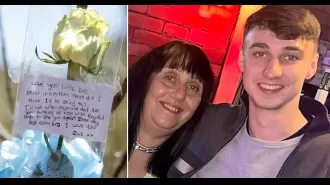Sophie Willan thinks that Right Said Fred are not funny at all.
Sophie Willan is a highly regarded talent in Britain, except for Right Said Fred.
November 10th 2024.

Sophie Willan is a rising star in Britain, and despite some misconceptions about her, she is definitely on the path to success. Her second series of the award-winning Alma's Not Normal has been praised as the comedy of the decade, and she is also currently starring in the most successful drama on the BBC. Some might even say she is the most exciting talent in Britain today.
But Sophie's drive for success can be traced back to the Conservative Party's rise to power in 2010, and their cuts to welfare and mental health services. This motivated her to create Alma's Not Normal, a comedy-drama that will make you laugh and cry. It follows Alma, a determined young woman from Bolton whose mother struggles with addiction and who was raised by her strong-willed grandmother, Joan. In the second series, Joan is diagnosed with terminal cancer, adding another layer of emotion to the already powerful show.
Despite the heavy subject matter, Alma's Not Normal is filled with hope and humor, loosely based on Sophie's own experiences with the care system. She hopes to use the show to educate people on empathy, and it has even been shown in universities to social work students. But Sophie is quick to point out that she is different from Alma, although their journeys share many similarities in their childhoods, ambitions, and eventually their grief.
Sophie's grandmother Denise was a huge influence on her life, always encouraging her to follow her dreams. Sadly, Denise passed away just after the first series of Alma's Not Normal aired, and a year later, Sophie was writing the death of Alma's grandmother Joan. Drawing from her own experience of losing a loved one to cancer, Sophie wanted to portray the mundane and often humorous moments that come with such a difficult experience. But she also found a safe haven in spa breaks and long walks with her new dog, as she processed her own grief while writing the show.
Despite the personal and emotional nature of Alma's Not Normal, Sophie also injects plenty of humor into the show. Some scenes, such as Joan's camp funeral, were directly lifted from her own experience, with guests dressed in leopard print and dancing to Shaggy's "Mr Bombastic." In the end, Sophie hopes that the show will make viewers laugh and cry, just like real life.
Sophie Willan is a name that is on everyone's lips in Britain. She's a force to be reckoned with, and some may even say she's a bit of a battle axe. But for Sophie, this assumption comes with the territory of being a woman with a plan. Despite any misconceptions people may have, her plan is going swimmingly.
Her award-winning comedy-drama, Alma's Not Normal, has been acclaimed as the funniest show of the decade - and that's no small feat. In addition to this, she's also starring in the BBC's most successful drama of the year, Ludwig, alongside popular actors David Mitchell and Anna Maxwell-Martin. It's safe to say that Sophie is, without a doubt, one of the most exciting talents in the UK right now.
But Sophie's drive for success stems from a difficult past. As a Care Leaver, she faced numerous challenges, especially when the Conservative Party came into power in 2010 and made drastic cuts to welfare and mental health services. This only added to the stigma and demonization of those who relied on these services. This experience is what inspired her to create Alma's Not Normal, a comedy-drama that will make you laugh and cry in equal measure.
The show follows Alma, a young woman from Bolton with big dreams and a cigarette in hand, as she navigates life with her addicted mother and strict grandmother Joan, who raised her after she grew up in care. In the second series, Joan is diagnosed with terminal cancer, adding another layer of complexity to the show. Despite the heavy subject matter, Alma's Not Normal remains hopeful and incredibly funny, drawing inspiration from Sophie's own experiences with the care system.
Speaking of her show, Sophie says she wants to educate people on empathy. In fact, the first series of Alma's Not Normal was even shown in universities to social work students. This, to Sophie, felt more significant than winning a Bafta. She also emphasizes that while the show is loosely based on her own experiences, she is very different from her character Alma. However, she did pour a lot of her own trauma and emotions into the show, making their journeys share obvious parallels.
Sophie's love for her grandma Denise is evident in every interview she gives. She credits Denise for instilling in her the courage to follow her dreams. Even though Denise passed away soon after the first series aired, Sophie was still able to write the second series, which dealt with Alma's grief over the death of her beloved grandmother. This was a difficult process for Sophie, who found solace in spa breaks and long walks with her new dog.
Writing about death and grief was not an easy task for Sophie, but she found a way to infuse humor into the show. Some moments were even directly taken from her own experience, like the spectacularly camp funeral for Joan, with guests dressed in leopard print and Shaggy's "Mr Bombastic" playing as her song of choice. In reality, Denise's funeral was even campier.
Despite the challenges and emotional toll of writing about such heavy topics, Sophie believes that it was a necessary and therapeutic process. She hopes that Alma's Not Normal will bring awareness and understanding to issues surrounding mental health and the care system, and urges viewers to have empathy for those who may be going through similar struggles.
But Sophie's drive for success can be traced back to the Conservative Party's rise to power in 2010, and their cuts to welfare and mental health services. This motivated her to create Alma's Not Normal, a comedy-drama that will make you laugh and cry. It follows Alma, a determined young woman from Bolton whose mother struggles with addiction and who was raised by her strong-willed grandmother, Joan. In the second series, Joan is diagnosed with terminal cancer, adding another layer of emotion to the already powerful show.
Despite the heavy subject matter, Alma's Not Normal is filled with hope and humor, loosely based on Sophie's own experiences with the care system. She hopes to use the show to educate people on empathy, and it has even been shown in universities to social work students. But Sophie is quick to point out that she is different from Alma, although their journeys share many similarities in their childhoods, ambitions, and eventually their grief.
Sophie's grandmother Denise was a huge influence on her life, always encouraging her to follow her dreams. Sadly, Denise passed away just after the first series of Alma's Not Normal aired, and a year later, Sophie was writing the death of Alma's grandmother Joan. Drawing from her own experience of losing a loved one to cancer, Sophie wanted to portray the mundane and often humorous moments that come with such a difficult experience. But she also found a safe haven in spa breaks and long walks with her new dog, as she processed her own grief while writing the show.
Despite the personal and emotional nature of Alma's Not Normal, Sophie also injects plenty of humor into the show. Some scenes, such as Joan's camp funeral, were directly lifted from her own experience, with guests dressed in leopard print and dancing to Shaggy's "Mr Bombastic." In the end, Sophie hopes that the show will make viewers laugh and cry, just like real life.
Sophie Willan is a name that is on everyone's lips in Britain. She's a force to be reckoned with, and some may even say she's a bit of a battle axe. But for Sophie, this assumption comes with the territory of being a woman with a plan. Despite any misconceptions people may have, her plan is going swimmingly.
Her award-winning comedy-drama, Alma's Not Normal, has been acclaimed as the funniest show of the decade - and that's no small feat. In addition to this, she's also starring in the BBC's most successful drama of the year, Ludwig, alongside popular actors David Mitchell and Anna Maxwell-Martin. It's safe to say that Sophie is, without a doubt, one of the most exciting talents in the UK right now.
But Sophie's drive for success stems from a difficult past. As a Care Leaver, she faced numerous challenges, especially when the Conservative Party came into power in 2010 and made drastic cuts to welfare and mental health services. This only added to the stigma and demonization of those who relied on these services. This experience is what inspired her to create Alma's Not Normal, a comedy-drama that will make you laugh and cry in equal measure.
The show follows Alma, a young woman from Bolton with big dreams and a cigarette in hand, as she navigates life with her addicted mother and strict grandmother Joan, who raised her after she grew up in care. In the second series, Joan is diagnosed with terminal cancer, adding another layer of complexity to the show. Despite the heavy subject matter, Alma's Not Normal remains hopeful and incredibly funny, drawing inspiration from Sophie's own experiences with the care system.
Speaking of her show, Sophie says she wants to educate people on empathy. In fact, the first series of Alma's Not Normal was even shown in universities to social work students. This, to Sophie, felt more significant than winning a Bafta. She also emphasizes that while the show is loosely based on her own experiences, she is very different from her character Alma. However, she did pour a lot of her own trauma and emotions into the show, making their journeys share obvious parallels.
Sophie's love for her grandma Denise is evident in every interview she gives. She credits Denise for instilling in her the courage to follow her dreams. Even though Denise passed away soon after the first series aired, Sophie was still able to write the second series, which dealt with Alma's grief over the death of her beloved grandmother. This was a difficult process for Sophie, who found solace in spa breaks and long walks with her new dog.
Writing about death and grief was not an easy task for Sophie, but she found a way to infuse humor into the show. Some moments were even directly taken from her own experience, like the spectacularly camp funeral for Joan, with guests dressed in leopard print and Shaggy's "Mr Bombastic" playing as her song of choice. In reality, Denise's funeral was even campier.
Despite the challenges and emotional toll of writing about such heavy topics, Sophie believes that it was a necessary and therapeutic process. She hopes that Alma's Not Normal will bring awareness and understanding to issues surrounding mental health and the care system, and urges viewers to have empathy for those who may be going through similar struggles.
[This article has been trending online recently and has been generated with AI. Your feed is customized.]
[Generative AI is experimental.]
0
0
Submit Comment





